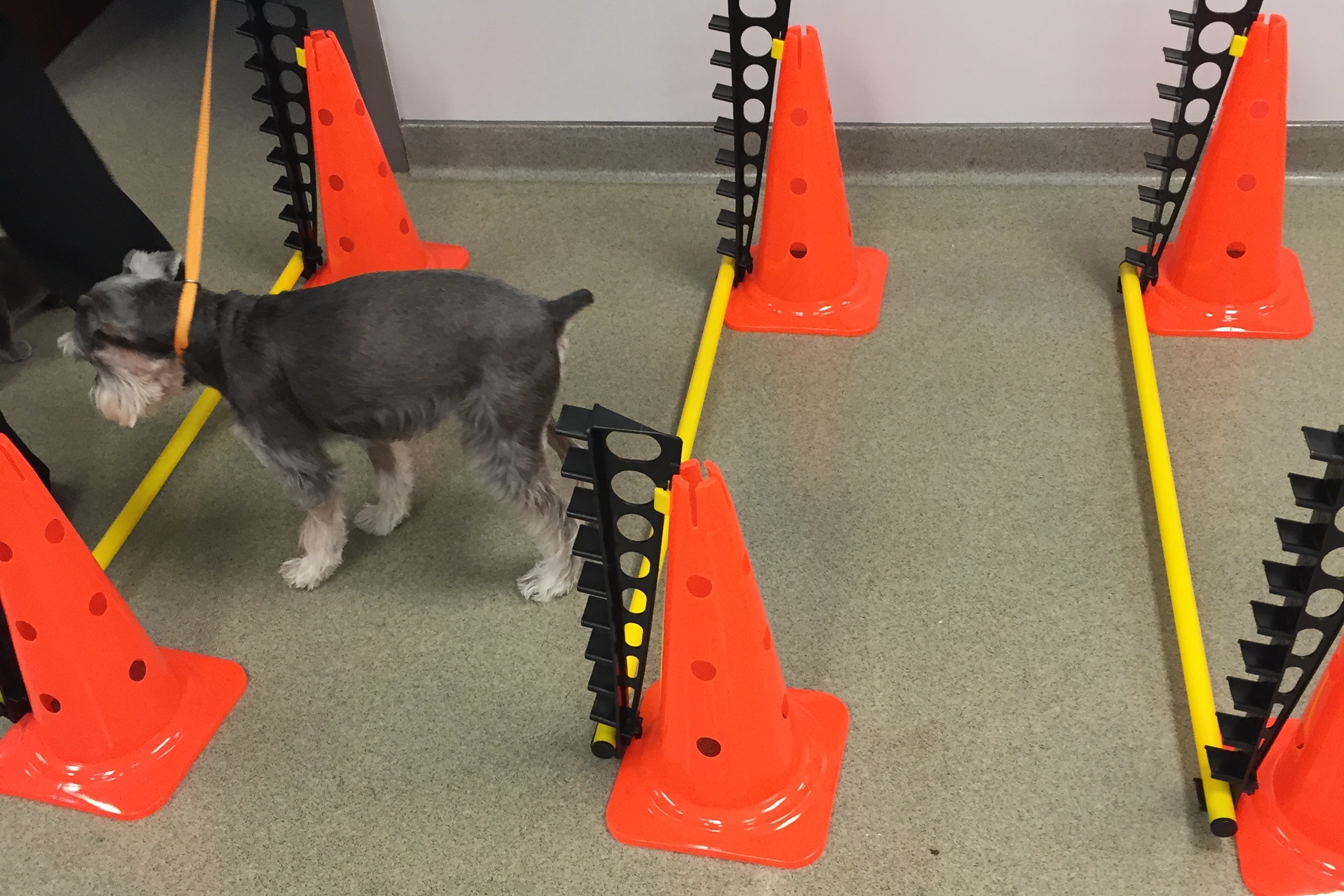

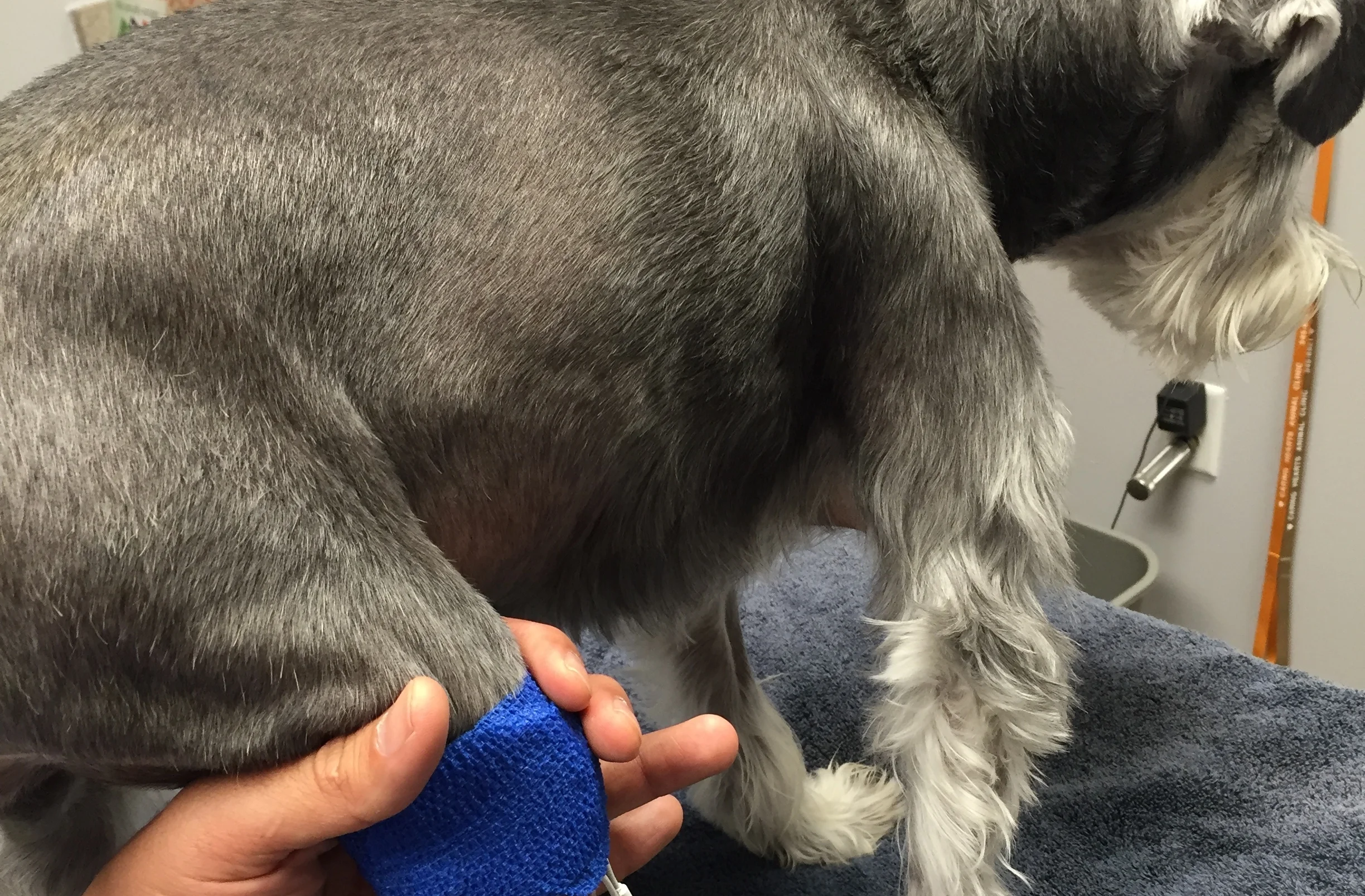
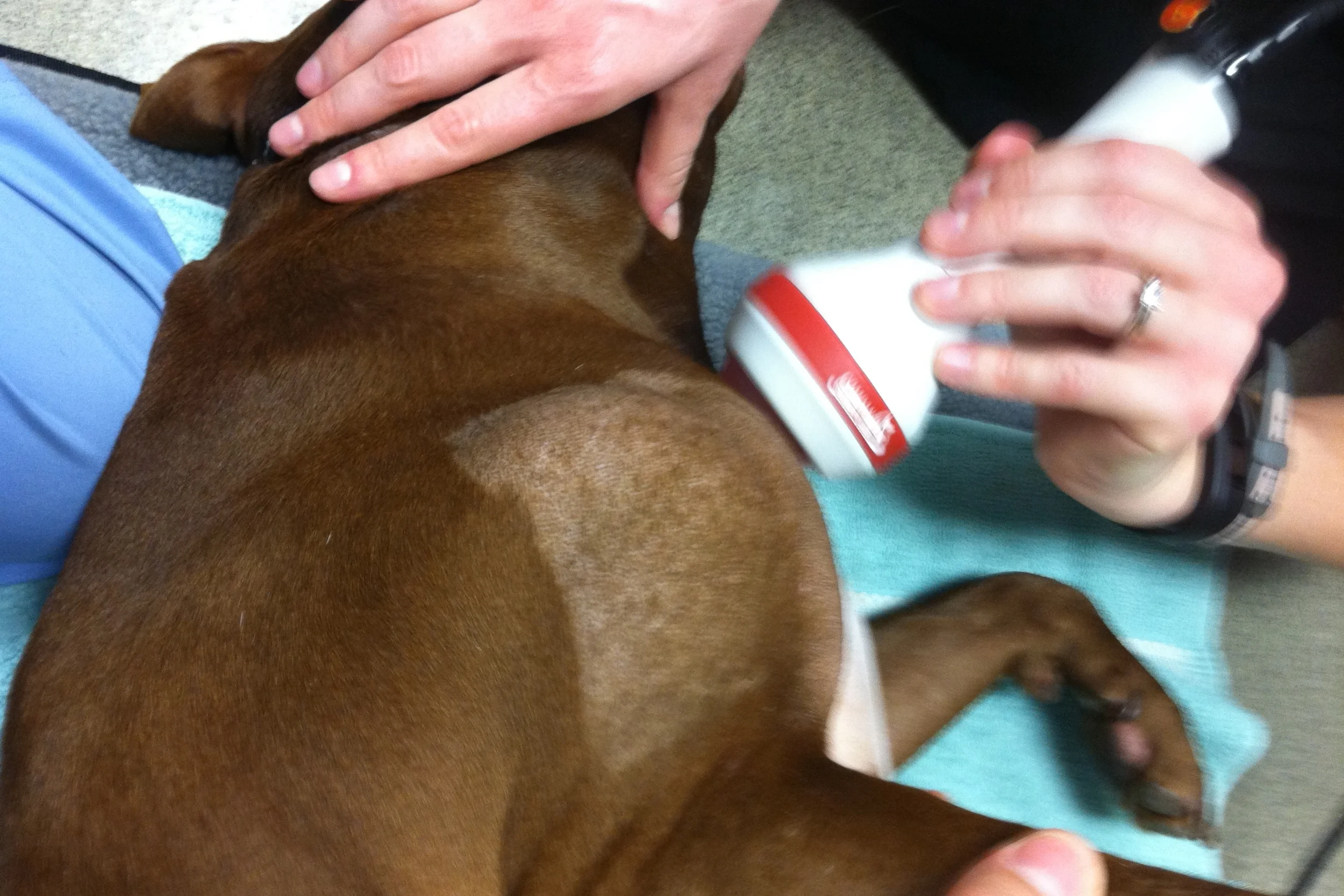
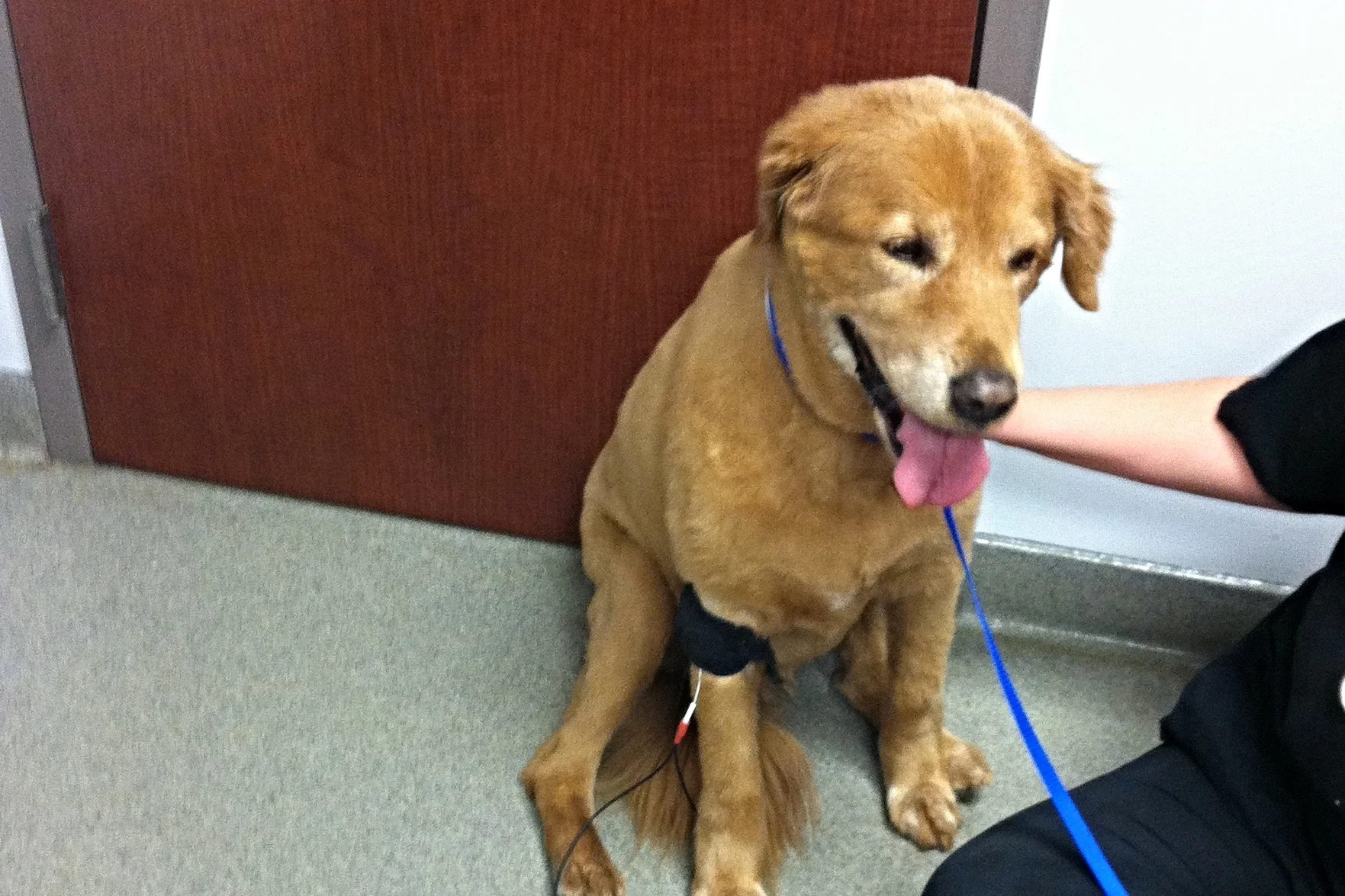
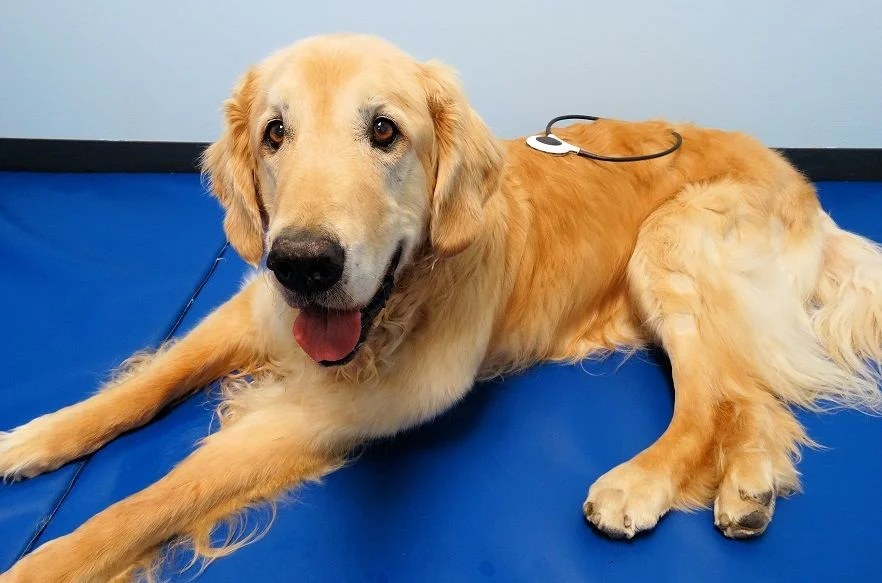



Underwater Treadmill
Getting Your Pet
Back on Their Paws
Underwater Treadmill
Getting Your Pet
Back on Their Paws
Underwater Treadmill
The underwater treadmill has proven to be so effective in treating a wide range of problems from chronic pain to muscle weakness, orthopedic and neurological post-surgical conditions in dogs, for example arthritis, patellar luxation, hip dysplasia, ACL injuries, spinal conditions, obesity and for healthy fitness program, to mention a few.
Water prevents body weight from stressing painful joints. Underwater treadmill can remove nearly 60% of a pet’s body weight while they are water walking when compared to land. A 15-minute session on underwater treadmill is equivalent to an hour on dry land activity. The underwater treadmill is simply amazing and beneficial.
Benefits of the underwater treadmill include the following:
- Facilitates earlier return to function
- Reduces joint compression
- Builds muscle mass
- Re-educates nerves and muscles
- Improves balance and proprioception
- cardiovascular endurance
- Increased joint flexibility
- Increased wellbeing
- decrease joint pain
- Unloads painful/arthritic weight-bearing joints
- Provides a safe, controlled environment to exercise
- Decreases swelling in submerged body parts with hydrostatic pressure
- Reduces risk of injury and reduces joint concussive forces

Electrical Stimulation
E-STIM
ELECTRICAL STIMULATION
Electrical Stimulation
E-STIM
ELECTRICAL STIMULATION
ELECTRICAL STIMULATION
Electrical stimulation uses different types of electrical current to stimulate tissues.
Transcutaneous electrical nerve stimulation (TENS) helps control acute EE and chronic pain, edema, and decrease muscle spasms caused by osteoarthritis, spondylarthrosis and post-orthopedic or post-neurologic surgery
Neuromuscular electrical stimulation (NMES) helps increase joint mobility, decrease joint contracture, decrease edema, enhance circulation, minimize disuse atrophy, improve muscle strength, improve sensory awareness, decrease spasticity, diminish pain, and correct gait abnormalities
NMES can be used in joint contracture, muscle atrophy, inherited labrador myopathy, postoperative atrophy, nerve injury, to improve limb function, decrease pain, muscle spasm (IVDD), edema, ACL postsurgical, femoral head and neck ostectomy, conservative treatment in shoulder instability or iliopsoas muscle trauma, post-surgical fracture repair, spinal cord injuries, paralysis or paresis

Manual Therapy
Your Pet
Needs a Helping Hand
Manual Therapy
Your Pet
Needs a Helping Hand
Manual Therapy
Manual therapy consists of stretching, therapeutic massage, range of motion, joint mobility, acupressure, myofascial release.
Stretching: is the process of passively lengthening the muscle tissue, returning it to its elongated state, thereby maintaining strength and joint integrity. Some medical benefits of stretching are:
- Relieves muscle pain from chronic tension
- Reduces post exercise soreness and stiffness
- Increases blood supply and lymph circulation to the treated region
- Oxygenates and provides nutrients to treated region
- Prevents inflammation and adhesion (scar tissue) formation,
- Decreases trigger point formation and stress point build up
- Relaxes both mentally and physically
- Increased flexibility
- Lengthens muscle fibers
- Increases extensibility of joints, tissues, muscles, and tendons
- Prevents muscle atrophy
- Decreases muscle stiffness
- Preventing injuries
- Helps release muscle contracture caused by scars
- Develops body awareness and improving coordination
- Improves limbs range of motion, stride length, coordination and response time to reflexes
Massage therapy
This refers to the manipulation of soft tissues of the body. It has an Influence on physical and physiological wellbeing of your animal.
Massage is a very important modality in canine rehabilitation as it allows the therapist to bond with patient through touch, and also acts as a diagnostic tool for detecting any soft tissue site of swelling, inflammation or pain that may be an indication of an injury or undiagnosed health issue. There are many benefits when your dog receives therapeutic massages, such as increased circulation.
Increased circulation of blood flow leads to improved oxygenation, and reduced fibrous tissue adhesions that result from inflammation caused by a muscle strain or by wounds. Massage therapy also targets your dog’s triggered stress points in order to achieve lymphatic drainage, relaxation, and stimulation by increasing your pet’s endorphins.
Medical conditions that may benefit from massage are arthritis, intervertebral disc disease, muscle cramps, torn ligaments, and early morning stiffness. Soothing contact will relax the nervous system while also reliving your pet's stress and pain. Mechanical effect will increase local blood circulation, nutrient and O2, and remove all of those terrible toxins and waste.
Joint Mobilization
Joint mobilization: consist of passive movements, oscillatory movements or sustained stretch of joints and associated soft tissues. These range of motion exercises enhance flexibility and motion in post-operative patients and dogs with chronic conditions. The exercises also help prevent further injury to joints, muscles, tendons, and ligaments. Joint mobilization can minimize scar tissue formation, and has similar benefits as other manual therapies:
- Modulate pain and reduce soft tissue swelling, inflammation, or restriction
- Reduces muscle inhibition
- Corrects joint displacement and adjust joint subluxation
- Increased range of motion
- Hydrates joints by stimulating the production of synovial fluid
- Improved tissue extensibility
- Induced relaxation
- Mobilize or manipulate soft tissue and joints

Therapeutic Ultrasound & Laser Therapy
Time To Increase
That Range of Motion
Therapeutic Ultrasound & Laser Therapy
Time To Increase
That Range of Motion
Therapeutic Ultrasound
Therapeutic ultrasound transfers energy from sound waves to heat deep tissue in order to relive pain and muscle spasms, enhance wound healing and range of motion. This method of therapy can treat many clinical conditions such as:
Soft tissue shortening (contracture, scaring)
Decrease in range of motion
Subacute and chronic inflammation
Pain (muscle guarding, trigger points)
Tendinitis
Soft tissue wound healing and bone fracture healing
LOW-LEVEL LASER THERAPY
This modality is a non-invasive, drug free, treatment option for pets. Light from a specific laser penetrates tissue and interacts with cells causing biochemical changes called photo-modulation. Low level laser therapy has been extensively studied and has been effective in reducing pain, edema, and inflammation, while also enhancing healing. Low level laser therapy is not only used in physical therapy, but also in the general veterinary practice for common ailments such as otitis, lick granulomas, reducing post-surgical pain, promoting wound healing, and arthritis management.

Therapeutic Exercises
Improving
Muscle Strength
Therapeutic Exercises
Improving
Muscle Strength
Therapeutic Exercises
These are categorized in proprioception and balance exercises, gait training, muscle strengthening, core strengthening, coordination exercises, and weight bearing exercises.
Therapeutic exercises improve flexibility and balance, increase muscle mass and strength, enhance cardiovascular performance, and prevent further injury. Certain exercises can retrain and improve activities of daily living such as sitting, standing, walking, and stair climbing (just to name a few). It utilizes exercise equipment such as a land treadmill, underwater treadmill, physiorolls/balls, wobble board, balance board, weave polls, cavaletti rails… and more.
1. Weight Bearing Exercises
The goal of these exercises are to improve the amount of weight that is placed on an injured limb, and to prevent overuse of the contralateral limb by using theraballs/rolls, weight shifting, and the underwater treadmill.
2. Proprioceptive and balance training
These exercises are used for animals that are not correctly placing their paws on the ground due to a neurological condition or limb weakness. Proprioceptive training also improves muscle strength, coordination, improves recovery from injuries, and reduces the risk of future injuries.
3. Strengthening Exercises
This particular rehab method is strictly implemented to improve muscle strength by using the land treadmill, underwater treadmill, or stair ascending, and descending exercises.
4. Gait Training
This type of training helps pets learn how to walk correctly again from injuries or surgeries. Gait training also enhances body awareness of limbs that are affected significantly by many orthopedic or neurological conditions, and age-related ailments.
5. Land Treadmill
The land treadmill is a great workout as it improves muscle strength and cardiovascular endurance. It is also very effective in treating a wide range of conditions from gait and balance abnormalities, muscle weakness, and don't forget how great of a tool this is for weight loss.

Pulsed Electromagnetic Field Therapy
PEMF
Stimulating Healing
Pulsed Electromagnetic Field Therapy
PEMF
Stimulating Healing
Pulsed Electromagnetic Field Therapy
Commonly abbreviated as PEMF, Pulsed Electromagnetic Field Therapy is the perfect post-surgical remedy for your canine. PEMF delivers a beneficial, health-enhancing, electromagnetic current to the cells. Low frequency PEMFs penetrates every cell, tissue, organ, and bone, without being absorbed or altered. PEMF stimulates most of the electrical and chemical processes in the tissues. Therapeutic PEMFs are specifically designed to positively support cellular energy, resulting in better cellular health and function.
Pulsed Electromagnetic Field Therapy has been approved by FDA for palliative treatment of post-operative edema and pain in humans to reduce pain and inflammation. PEMF is shown to slow the progression of arthritis in animals. It has been proven to be as effective as NSAIDs in the treatment of pain and edema. It has been used to treat pain and inflammation from post-surgical and wound healing and arthritis in animals.

Home Exercise Program
Getting Better
Without Leaving Home
Home Exercise Program
Getting Better
Without Leaving Home
Home Exercise program
Your pet will have a personalized, internet based, home exercise program that will instruct you how to train your pet and keep them on track at home. We make home rehabilitation possible by use of photos and instructional videos of exercises you can continue at home so that you can maintain your pets progress and can be directly involved in your pet's rehabilitation treatment.
The online library contains many types of exercises that can be performed by your pet. Your pet's library will contain only exercises that are prescribed to them by Dr. Montes. He will specifically target and recommend exercises that will reach the main goal or function for your pet's recovery. Some particular exercises include limb or joint, balancing/proprioception, conditioning, gait massages, strengthening, and stretching.
The exercise programs will take no more than 30 minutes of your time at home, but daily continuation of treatment is very important for your pet’s recovery. Our clinic can also assist you in purchase or rental of rehabilitation equipment necessary for your pet's home exercises, and for continuation after the rehabilitation program. We can also assist you in home gym equipment for your pet.

Stance Analyzer
Let's Fix that
Broken Stance
Stance Analyzer
Let's Fix that
Broken Stance
Stance Analyzer
The Stance Analyzer objectively diagnoses lameness and assesses treatment effectiveness. The stance analyzer is a piece of equipment that your pet stands on and measures the static weight bearing on each limb so we can measure and objectively diagnose the lameness or painful leg that the pet does not want to stand on, and helps us monitor progress of pain medications, surgeries, and physical therapy. Some clinical benefits of the Stance Analyzer product are:
- Monitor improvement and track patient progress over time
- Quick, easy, non-invasive diagnosis
- Validates treatments
- Eliminates subjective interpretation
- Assess treatment protocol for effectiveness
This revolutionary machine provides us with a fast, accurate, non-invasive, method of assessing lameness in our animals. Data is collected and reported in real-time to support an ongoing lameness treatment protocol.Once lameness is detected, the Stance Analyzer makes exploring treatment options more efficient. The system provides objective data to assess how effective a treatment program is working. Repeated exams prove the success of treatment methods or show the need to explore additional options. This machine is most useful in proving guidance to us, and proof to you that the prescribed treatment is working.
